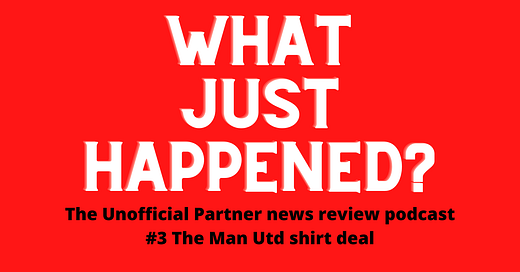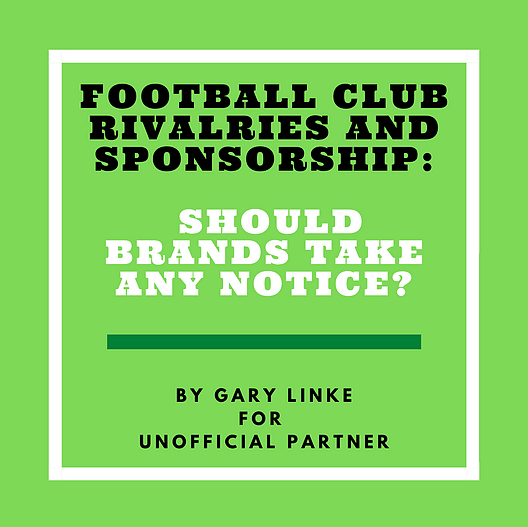Unpicking the Man Utd shirt; Big signals and market noise; Football's leakage problem; WSL sustainable in 'three media cycles'; Sponsorship myths; UEFA reform and the threat that always works
The newsletter of the podcast
Overthinking the Man Utd shirt deal
In this week’s podcast, me and Tim Crow took apart Manchester United’s new shirt deal with German tech platform TeamViewer - UP Pod #151.
The sponsorship industry is prejudiced against football shirts
Most sports marketing agencies make their money from activation, not the sale of rights. This shapes their point of view on the effectiveness of sponsorship and the advice they give their clients, which often frames football shirts as ‘just an awareness play’ or worse still, ‘a media buy’.
Somewhere along the line, awareness became a dirty word
Tim Crow on the argument for big shirts:
Tim Crow: There are people who think they invented sports marketing in 2014, who don't rate awareness as a measure or an objective, but that's simply nonsense.
If you're trying to build a brand quickly which these guys are trying to do, then a shirt is a good idea. Because they've got a window now, with the single most important objective to get their brand name into as many people's brains as possible. They want the people who make decisions to be thinking about them along with Zoom and Teams and Google and whatever else it is. So, if you think about cost and speed to market, and you think about what a global ad campaign would cost, then football and a front of shirt sponsorship with one of the big clubs is hard to beat.
The psychology of big signals
I don’t believe Utd has 1.1billion fans, as quoted in the news release materials.
But even a Spurs fan has to concede that United is a ‘very big club’.
And this bigness is in itself the point. It’s the key intangible asset being sold here.
TeamViewer is buying that bigness. It is saying to the world, we too are big, look at us, buying big things and being seen among other big sponsors. This is the company we keep.
This ‘costly signalling’ is how television advertising and big ticket sport sponsorship works. They are known to be expensive and signal to their audiences the resources available to the brand.
As John Kay wrote in his landmark paper:
"The advertiser has either persuaded lots of people to buy his product already, a good sign, or has persuaded someone to lend him lots of money to finance the campaign."
There are certainly plenty of power signals in the announcement note to shareholders:
So why did the markets respond so badly?
Bloomberg wrote that TeamViewer’s share price dropped following the news of the Man Utd shirt deal.
There was a graph:
That pink bit looks like the Wall St crash. But go to Yahoo Finance today and it looks different.
When it comes to this stuff, I’m just another Taleb fanboy, and his Fooled by Randomness has been a non-mover in my top three list of books on any subject. His view is that short term price movements are a study in attribution error.
Taleb: Over a short time increment, one observes the variability of the portfolio, not the returns. In other words, one sees the variance, little else.
A 15% return with a 10% volatility (or uncertainty) per annum translates into a 93% probability of making money in any given year. But seen at a narrow time scale, this translates into a mere 50.02% probability of making money over any given second. Over the very narrow time increment, the observation will reveal close to nothing. The same methodology can explain why the news (the high scale) is full of noise and why history (the low scale) is largely stripped of it (though fraught with interpretation problems).
The markets saw the Utd deal’s big number - which may or may not be the real one btw - and baulked.
Fwiw, Tim Crow is with Taleb:
UP: How much faith do you have in the stock market as a judge of sponsorship deal?
Tim Crow: Zero.
And as my Twitter companion noted, second guessing why this happened is a fool’s errand.

That said, there are plenty of potential pitfalls awaiting TeamViewer. The bigger the deal the greater the potential for wastage, defined as rights that you paid for but didn’t use. Over the course of a five year term, these can really add up to a lot of money.
Every top football club wants to plug the media money leak
The commercial value of football clubs is undermined by their inability to capture the media activation budgets of their own sponsors.
TeamViewer paid 47million for the shirt, but the company will now spend many millions more in associated advertising.
Much of this will be done by United’s in-house agency which will create hours of digital content featuring Phil Jones talking to Harry Maguire via Remote Desktop Technology.
Then, they will seek to make this content famous out there in the world, by amplifying it across digital channels.
It’s at this point that much of TeamViewer’s media money flows out of the football economy and into Facebook and Google.
This was the problem that Dugout was created to help solve (hear co-founder Elliot Richardson on UP Pod #18 ‘Dugout and the clip economy’), and why Chelsea, Man City, Bayern, FC Barcelona, Real Madrid etc etc bought in as shareholders.
Dugout is now part of OneFootball, but the project continues: creating a digital media network of football fans that offers a viable alternative to the FAANGs, for sponsors and other football focused advertisers.
Note the announcement this week, that Spurs and Borussia Dortmund had joined the club. More evidence that there’s a shift in thinking at board level within football when it comes to maximising a return from the digital economy.
Digital rights are part of the clubs’ UEFA land grab
According to The FT’s UEFA scoop, there are moves afoot to shift ownership of key Champions and Europa League rights in to a new JV with the clubs.
The piece came courtesy of the brilliant Murad Ahmed (UP Pod #128).
That sports biz regular, the ‘person with knowledge’ was doing some of the heavy lifting:
One person with knowledge of the talks said some teams wanted TV contracts that would allow them to screen match replays soon after the final whistle, or allow club sponsors to feature more prominently at stadiums during games.
The new company could also act as a vehicle for even more radical changes, said those involved in the talks. This includes developing internet streaming services to screen matches, rather than selling them to pay-TV broadcasters, or allowing private equity firms to invest in European competitions.
National leagues, such as Italy’s Serie A, Germany’s Bundesliga and Spain’s La Liga are in discussions over selling a stake in their competitions to outside investors.
Asked if similar deals should be an option for the Champions League, Andrea Agnelli, ECA chair and president of Italy’s Juventus, said last month: “The possibility of welcoming investments from third parties . . . is not something that should be precluded.”
The history of the football business is peppered with phrases like, ‘Not something that should be precluded’.
It seems that Octagon sage Phil Carling was right. (Hear Carling on UP Pod #118 ‘The business of European football).
Carling: ‘The European Super League is a regular threat, and it always works’.
WSL sustainable in ‘three media cycles’
I sat quietly at the back of the Women in Football Clubhouse room this week, on the day the WSL’s new £8million BBC/Sky rights deal was announced. It was a really good session, led by Jo Tongue of Tongue Tied Management fame.
Kelly Simmons MBE, The FA’s pioneering Director of Women’s Game, was the star turn and she was rightly proud of how far things have come. But Simmons had a warning for those who might be fooled in to thinking the game was now awash with cash.
Asked about the financial sustainability of the league, Simmons said this would likely take three media cycles, which The FA’s media team frame as being around 2033.
The view from the WhatsUP Group
Gary Linke asked the group if team sponsorship risked alienating rival fans.
The result was this stellar article on UP Yours, the Unofficial Partner guest blog.
Enjoy this newsletter? Tell your friends
Subscribe to the Unofficial Partner podcast.
Help us game the Substack algorithm by liking this newsletter and spread the word on social media.
Follow @RichardGillis1 and @PaulPingles (aka the ill-judged Twitter handle of Sean Singleton, the UP co-founder).
Read over 100 gushing five star reviews for UP on Apple Podcasts - click the link to add yours.










